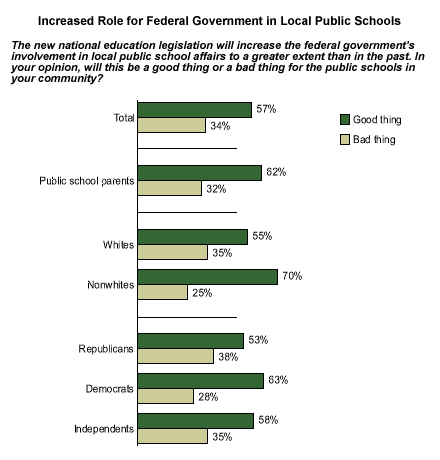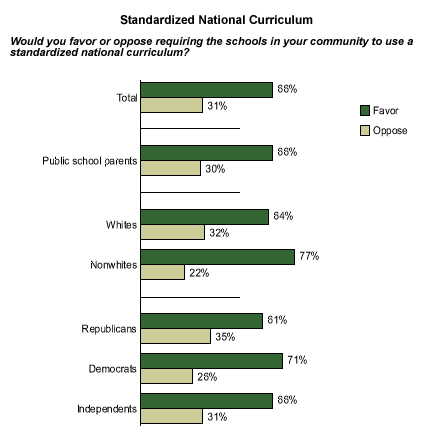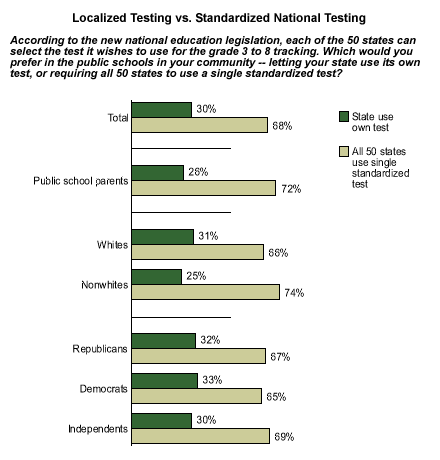The Washington Post recently reported on the struggling public school system in Altheimer, Ark., a district in which 90% of eighth graders scored below the "proficient" level on last year's Arkansas state English test. It would seem to be the kind of school system tailor-made for the No Child Left Behind (NCLB) Act, the federal law that requires states to identify failing schools and provide alternative educational opportunities for their students. But under NCLB, states are responsible for developing their own standards for defining "failing" schools, and according to Arkansas standards the Altheimer schools are not failing. In fact, Arkansas -- a state that ranks 49th in the percentage of students who complete college -- has yet to identify any of its schools as failing under the new law. Michigan, by comparison, has identified 1,513.
This type of dichotomy raises the question of how far-reaching the new NCLB legislation really is. In mandating that all states develop standards for failing schools and requiring them to measure schools according to those standards, the federal government has increased its involvement in public education, an area traditionally dominated by state and local governments. But should the federal government play an even larger role in overseeing public education in the Unites States -- perhaps to the extent of establishing a national curriculum?
Public Approves of Larger Federal Role in Public Education
Most Americans approve of a larger federal role in public education, according to the recent Phi Delta Kappa/优蜜传媒Poll of the Public's Attitudes Toward the Public Schools*. Fifty-seven percent of poll respondents said that NCLB's increased federal role in local public schools will be a good thing for the schools in their communities, compared to 34% who said it will be a bad thing. Support for increased federal involvement is slightly stronger among the parents of children in public schools -- 62% favor increased involvement. Although support for increased federal involvement in public schools does vary by race, education and political affiliation, a majority of nearly every demographic group favors it.

Americans Support National Curriculum and Standardized Testing
Furthermore, when looking at specific issues such as school curricula and standardized testing, it appears that a majority of Americans support the idea of a greater federal role in public school education than that required by NCLB. Currently, school curricula are primarily developed at the state and local levels. Respondents were asked if they would favor or oppose the idea of requiring a "standardized national curriculum" at the schools in their communities. Two-thirds (66%) of Americans are receptive to the idea, while 31% say they oppose it.

The results were similar when the PDK/优蜜传媒poll asked U.S. adults about their views on standardized tests. Respondents were first asked if they favor or oppose using an annual test to track the progress of students in their community. Sixty-seven percent were in favor; 31% were opposed. The poll then asked respondents if they favor letting their state use its own test to measure students' progress, or if they would prefer requiring all 50 states to use a single standardized test. Once again, more than two-thirds (68%) said they would prefer requiring all 50 states to use the same test. Support for a single test was similarly strong among public school parents and across all demographic groups.

Key Points
It's clear that most Americans feel that the federal government could be more of a help than a hindrance to their local public schools. In fact, poll data indicate the public would not be opposed if NCLB represented the beginning of a trend of increased federal control over local school systems. This is an interesting phenomenon, given that Americans tend to give the schools in their own communities higher ratings than they give to the country's schools as a whole (see "Americans Support New National Education Legislation" in Related Items.) The passage of NCLB seems to have helped generate more positive thinking about federal involvement in public schools.
*These results are based on telephone interviews with a randomly selected national sample of 1,000 adults, aged 18 and older, conducted June 5-26, 2002. For results based on this sample, one can say with 95% confidence that the maximum error attributable to sampling and other random effects is ±3%. In addition to sampling error, question wording and practical difficulties in conducting surveys can introduce error or bias into the findings of public opinion polls.